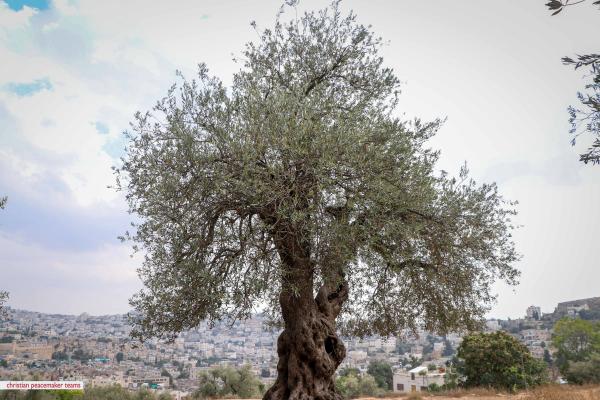The State Wants to Remember For You. Don’t Let It.

I need you to remember that Palestine is a land of olive trees. I need you to remember that where every settlement is, there were ancient olive trees, cared for by generations upon generations, olive trees resident, olive trees resplendent, on the lands where the Palestinian peoples live. Hundreds of thousands of olive trees have been burned or felled or attacked by settlers over the decades. The Israeli state levels towns and burns olive trees and has been doing so since before the first Nakba. The Israeli state does so to prevent people from remembering there was a Nakba.
Throughout the decades of Israel’s occupation, settlers would replace street names and town names when they took the homes of people. Israeli-born historian Ilan Pappe, in his 2007 book, “The Ethnic Cleansing of Palestine,” details how after the Nakba, the Jewish National Fund planted forests-worth of non-native conifer trees—cypress and pine—so as to totally change the natural and mental landscape. Often these conifers were planted over small villages, homes, groves of olive trees. Many of these plantings would grow to anchor national parks, where the state’s version of memory is on full display through memorial plaques and video monitors, none of which tell the actual stories of the Palestinian villages razed underneath. For Pappe, these parks “continue to spout the familiar myths of the narrative – Palestine as an ‘empty’ and ‘arid’ land before the arrival of Zionism – that Zionism employs to supplant all history that contradicts its own invented Jewish past.” Pappe points out that only about 10% of forests in the territory of the state of Israel date back to before 1948.
We see in the current ongoing political project of ethnic cleansing Gaza how many buildings are being wiped out. Cultural centers, bakeries, hospitals, memorials, murals, mosques, Orthodox Christian churches, schools, universities. Tangible connections to culture and lifeways blasted to blood-stained rubble. The state would like for everyone, including Palestinians, to eventually forget that any of that life was there in the first place. It’s easier for everyone if you just remember what the state tells you to remember. Less cognitive dissonance. Don’t hurt your widdle head :(
Pappe calls these processes of state action “memoricide.” Settler-colonialism is a project of memoricide. And this project requires the forcible compliance of our memories, whether we are the colonized or whether we are the settlers. Books of history, the archive, oral histories passed down by elders—all are crucial ways of bearing & preserving memory. All of which are & will be attacked by the state. I encourage you to read Pappe’s book, especially if you are interested in the frame I have opened with here about Israel’s national parks service being a primary vehicle for memoricide. I also encourage you to read this article that I found while looking for a proper cover image for this brief essay: https://truthout.org/articles/the-story-of-palestines-colonization-and-resistance-is-embodied-in-the-trees/. I also encourage you to remember, broadly and deeply, everything you’re feeling lately. Even the exercise of sharing memories with your people can make for a crucial defense against the state’s assertion of its selective memory over your own.
I remember in 2017, when the Trump administration first held the reigns of the U.S. empire, there were a number of social media accounts dedicating themselves to writing down every single breaking of a governmental norm, every single moment evidencing a slide into overt fascism. This was a useful impulse to have, though of course this kind of social media posting lost steam over the years, as the liberal voting coalition worked towards the 2020 Biden campaign and as the global pandemic disrupted many of our lifeways to varying degrees. So far, three years into the Biden administration, there has not been significant effort to document the weekly microslides into fascistic governance that have happened under the Democrats. More of us are paying attention now, since 10/7. Since the U.S.’s increasingly cynical attempts to justify its enabling of the state of Israel’s genocide of Palestinians.
I remember, many of you do too (I hope! I hope!), how it was in the immediate years following the 9/11/2001 attacks. The state would like you to remember that America was less divided than ever, that we all came together under the flag rah rah blah blah. Absolute bullshit. Professional orientalism and cruel street violence against anyone with west, central, and south asian ethnicity was the suffocating atmosphere of those years. I hope you remember the attacks on religious centers. I hope you remember the egregious No Fly List that people were put on merely for being Muslim. I hope you remember the many antiwar protests, and the new policing methods and terminologies (such as “free speech zones”) that developed in response. I hope you remember the bipartisan effort to gut the personal privacy and liberty of U.S. residents, through the Patriot Act. I hope you remember how mercilessly you were taken to task for speaking out against these things, that it wasn’t all as pathetic as “freedom fries” was in response to France declining to join the so-called Coalition of the Willing. I hope you remember the constitutional pretzel that is the state declaring people “Enemy Combatants,” based on suspicion alone.
I hope you remember the people that stood up in ways large and small. My ways, in my small Missouri hometown, were quite small. I refused to stand up for the morning Pledge of Allegiance, nor did I recite it. I refused to stand up for the flag during the performing of the national anthem. I wrote anti-war opinion columns in my high school newspaper. Do you remember people like that in your town? Of any age? Do you remember the social blowback they got for even small acts of resistance? I remember the whispers and the glares and the choice words muttered under breath or into a pantomimed cough that were sent my way at the grocery store or at Wal-Mart. My precious mom even got some of that treatment by association, and to punish her for not disciplining this protest streak out of me, the lanky fairy “boy” with long hair and a sharp tongue. My fellow townsfolk were never this upset at my dad, and it was basically an open secret among people that me & my mom’s bruises were from his hands.
No? You don’t recall seeing that blowback, that bullying? The state is glad to hear it. The state thanks you for trusting it with your memory.
I’m not trying to make any of this about me, I’m just the me thinking through some things here. I’ve been trying to figure out what to say, if I should even say anything, during this time beyond expressing Free Palestine with my voice and my feet and my heart and my tweets. I’ve owed y’all an essay for a long time now, and I thank you for your patience as I recovered from my sars-cov-2 re-infection from back in August. For most of October I’ve been in grief and in desperate rage, none of which coming from me are interesting perspectives right now outside of conversation and commiseration. It was feeling navel-gazey, self-centered.
Reflecting on what my unique perspective is that I can speak from, it feels like I can speak to memory. I’ve begun of late to think of my overall artistic-educational-spiritual work as “memory work.” Between memoir & essay writing, between a pedagogy of deep remembering, between keeping the deep lore of heroes and of broken stairs in the communities I’m a part of, it’s all tied to memory. My book, “Hall of Waters,” is an act of memory work. And even as my short-to-medium-term memory has been affected by covid, I’ve still got a very very long one.
I’ve had to start taking more notes lately. Maybe more of us should. Maybe we should remember every bit of how horrified we feel at genocide. Maybe we should take pains to ensure that we remember this. Because as soon as is possible, the state will be asking you to forget. Its already doing its DARVO show in the moment, but soon whether there’s a “humanitarian pause” (gross), or a ceasefire (necessary but the bare minimum, and shakily-held), or the end of the occupation (Inshallah), the state will be asking you to let it keep the memories of how many people had died, of what buildings were destroyed and by whom, of what buildings were even there in the first place. The United States in particular will always gesture towards being the arbiter of the truth of what really happened. Absolute bullshit. Do not forget the U.S.’ direct complicity. Do not forget that the U.S. is itself a settler-colony, and its every function is to maintain its hegemony over the lands and peoples, to replicate itself each and every day, and further write over the worlds that were here before it and the worlds that can be again and the new worlds made of new relations that can replace that hegemony.
I need you to remember which cultural institutions are censoring the voices of Palestinians and the voices of anti-Zionist Jews and the voices of those willing to merely speak the word genocide aloud. I need you to remember in the short term and I need you to remember in the long run. I need you to remember which political leaders said what. I need you to remember the feeling you have been having the past few weeks—that feeling of being moved, compelled, to take to the streets or make a sign or take down a bigoted sign or to stand up for someone being berated on the bus or to change the world. That feeling of “not in my name, not in the name of me & my friends & my lovers & my people & my family & my community?” I need you to remember that feeling. I need you to remember that feeling when the state bargains with you, begging your forgetfulness.
I implore us, all of us, to not take shortcuts in how we remember. Send your roots down deep into memory’s well. Nurture yourself through those roots, not from the veritable bottle of Nestle water that is the state’s version of memory—something extracted from us and re-packaged. I need you to never forget that Palestine will be free. I need you to *remember* that Palestine will be free. The olive trees remember. I need you to remember that in some of these memoricide parks and woods, olive trees began growing up and through the blighted and broken trunks of pine. I need you to know that that is inseparably both a metaphor for how the Palestinan people are actively resisting, and a very literal instance of the land known as Palestine actively resisting, that there is a relation between both meanings, a relation that marks the material positionality of indigeneity. I need you to remember the olive trees.
